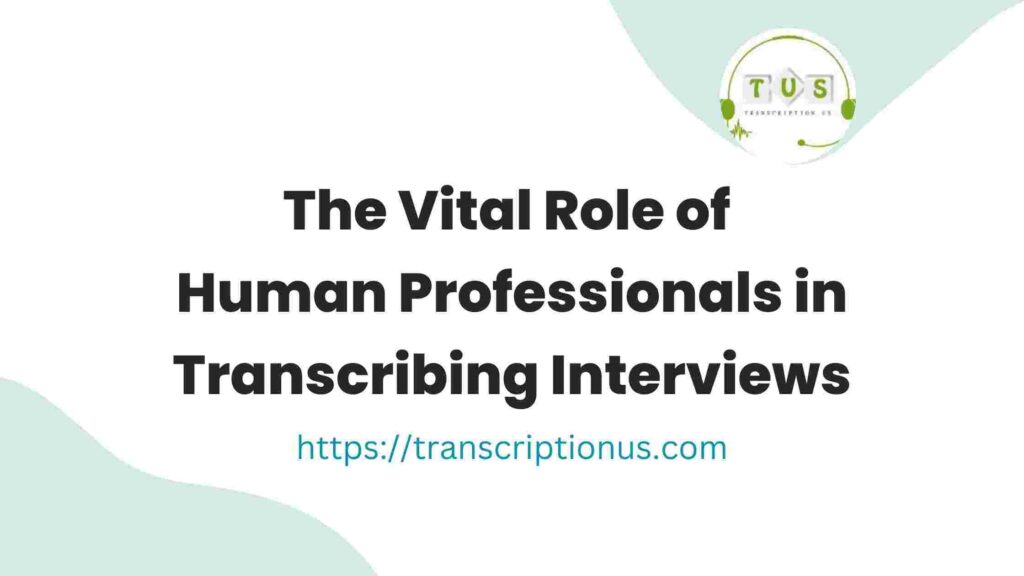
Introduction
Transcribing interviews plays a crucial role in capturing and preserving valuable information. Whether it’s a journalist conducting an interview, a researcher gathering data, or even an entrepreneur seeking insights from customer feedback, the importance of interview transcriptions cannot be overstated.
By transcribing interviews, we ensure that every word spoken is accurately documented and easily accessible for future reference. This not only helps in maintaining the integrity of the information but also allows for thorough analysis and interpretation.
Interview recordings are often filled with nuances, details, and perspectives that may go unnoticed during the initial conversation. Transcribing interviews provide a written record that can be reviewed multiple times, enabling deeper understanding and identification of key points.
Transcribing interviews allow for efficient organization and categorization of information. Researchers can easily search through transcripts to find specific quotes or themes without having to listen to hours of audio recordings.
In addition to their practical benefits, transcribing interviews also serve as valuable resources for sharing knowledge and insights with others. They can be used as references in academic papers, articles, or even as content for podcasts or videos.
Overall, transcribing interviews is essential in capturing accurate information, facilitating analysis and interpretation, enhancing organization efficiency, and promoting knowledge sharing. It is a valuable practice that should not be underestimated in various fields where interviews are conducted regularly.
The Expertise and Understanding Human Professionals Bring to the Table
Human professionals, such as professional interview transcribers, bring a wealth of expertise and understanding to the task of transcribing interviews. While technology has made significant advancements in speech recognition and automated transcription, there are certain benefits that only human transcribers can provide.
One of the key advantages of human transcribing is the ability to capture context accurately. Human professionals possess the knowledge and experience to understand nuances, accents, and dialects that automated systems may struggle with. This ensures that the final transcript reflects the true meaning and intent behind each spoken word.
Moreover, human transcribers have the ability to clarify any ambiguous or unclear sections during the transcription process. They can conduct research if needed to ensure accuracy, making sure that names, technical terms, or jargon are correctly spelled and understood.
Additionally, human transcribers bring a level of quality control that technology cannot replicate. They have an eye for detail and can identify errors or inconsistencies in speech patterns that might be missed by automated systems. This attention to detail ensures a high level of accuracy in the final transcript.
In conclusion, while technology has its place in transcribing interviews, it is important not to underestimate the expertise and understanding that human professionals bring to the table. Their ability to capture context accurately, clarify ambiguous sections, conduct research if needed, and provide quality control ultimately results in more reliable and accurate transcripts.
Capturing Non-Verbal Cues and Emotions in Interview Transcriptions
In the world of transcribing interviews, capturing non-verbal cues and emotions is a crucial aspect that adds depth and context to the spoken words. Transcribing interviews goes beyond just converting speech into text; it involves capturing the essence of the conversation, including the non-verbal cues and emotional undertones.
By paying attention to non-verbal cues such as facial expressions, body language, and gestures, transcribers can provide a more comprehensive account of the interview. These cues offer valuable insights into the emotions expressed by the participants, allowing readers to truly understand the sentiment behind their words.
The ability to capture emotions in transcribing interviews is essential for various fields such as psychology, market research, journalism, and more. It enables researchers to analyze not only what was said but also how it was said – uncovering underlying motivations, attitudes, and reactions that may not be conveyed through words alone.
Transcribers who excel at capturing non-verbal cues and emotions play a vital role in preserving the authenticity of interviews. Their meticulous attention to detail ensures that readers can experience the full spectrum of emotions expressed during these conversations.
In an increasingly digital world where face-to-face interactions are limited, accurate transcription with an emphasis on non-verbal cues becomes even more important. It allows us to bridge geographical distances while still understanding the emotional context of interviews.
Overall, we appreciate those skilled transcribers who go above and beyond in capturing non-verbal cues and emotions in their transcripts. Their dedication helps create a richer narrative that truly reflects the nuances of human communication.
Conclusion
The value of human professionals in transcribing interviews cannot be overstated. While technology has made great strides in speech recognition and transcription tools, it is the human touch that truly brings out the essence and accuracy of interview transcriptions.
Transcribing interviews requires more than just converting spoken words into written text. It involves understanding context, nuances, and emotions conveyed during the conversation. Human professionals possess the ability to capture these subtleties, ensuring that the final transcript is an accurate representation of the interview.
Transcribing interviews by human professionals have a critical eye for detail and can discern between homophones or unclear speech patterns that automated tools might struggle with. They can also handle multiple speakers, overlapping dialogue, or background noise effectively.
The importance of transcribing interviews cannot be underestimated. They serve as valuable resources for researchers, journalists, legal professionals, psychologists and various industries where accurate information is crucial. Transcripts not only provide a written record but also facilitate analysis and reference for future use.
While technology continues to advance in transcription capabilities, it is evident that human professionals bring an indispensable value to this process. Their expertise ensures precision and quality in capturing every word spoken during interviews while preserving the integrity of the content being transcribed.